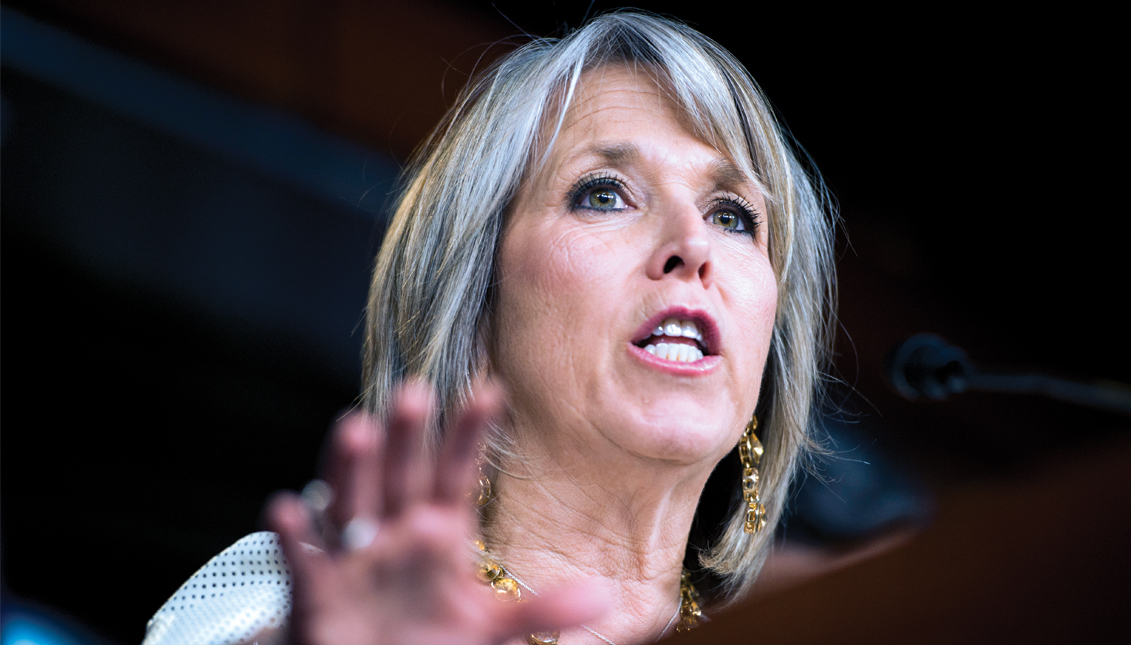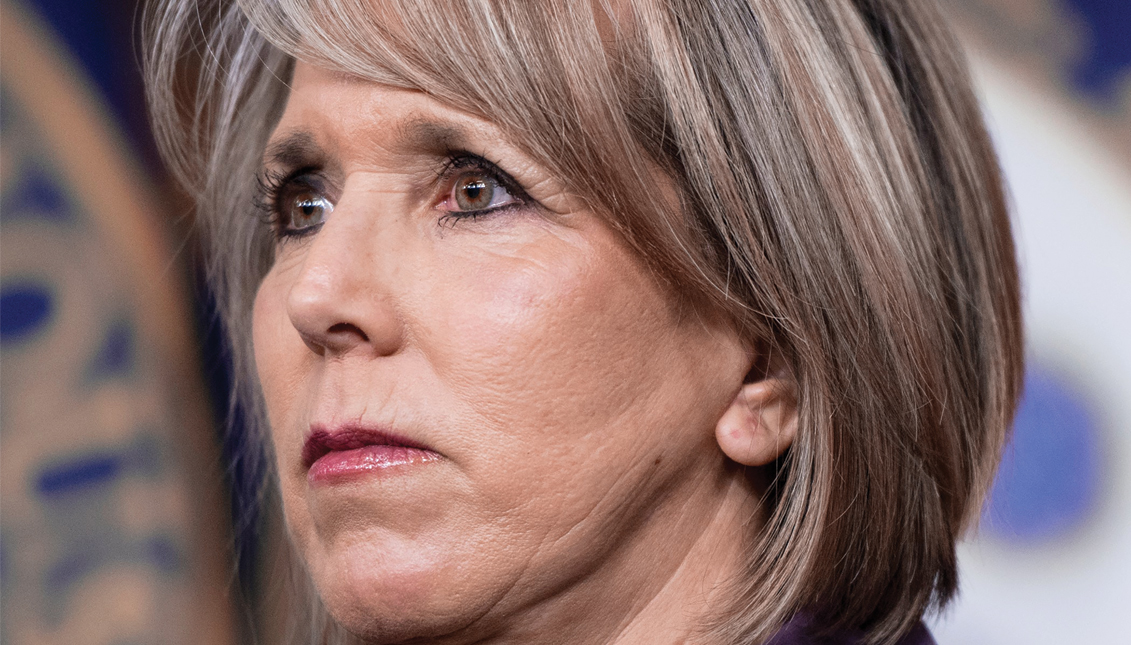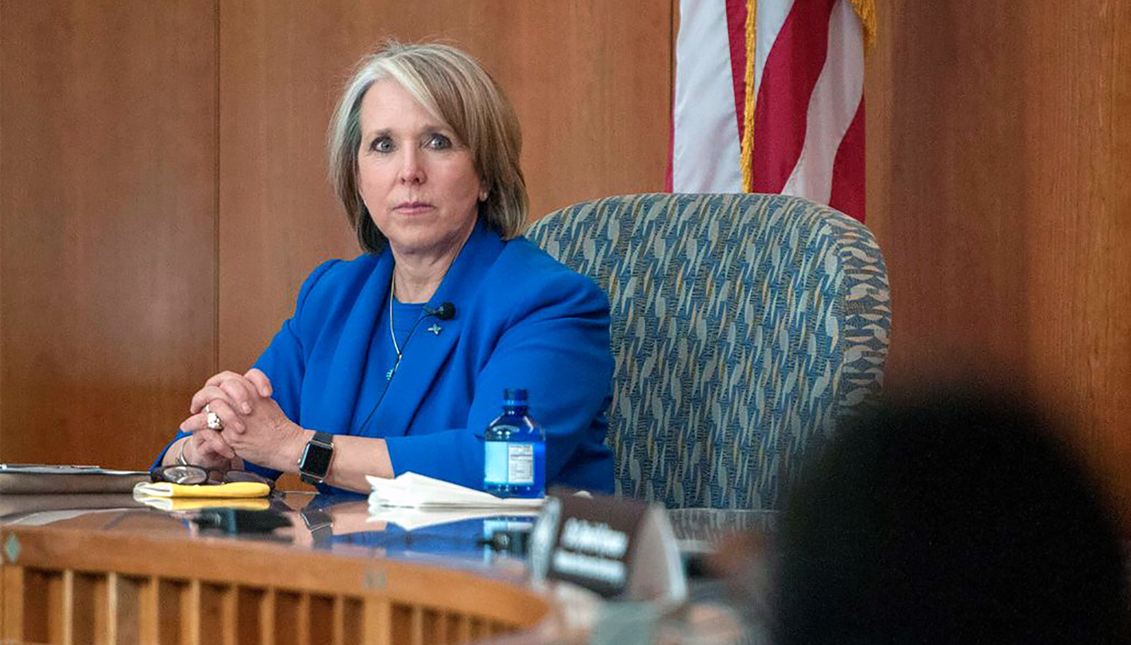
Michelle Lujan Grisham's Leadership: A Force To Be Reckoned With
The Latina governor of New Mexico has been one of the few leaders to effectively control the COVID-19 pandemic.
Making a career as a Latino politician in the United States has “a before and after” Donald J. Trump. For Michelle Lujan Grisham, these past few years have been an obstacle course that has made her a Hispanic icon in the country’s history.
Although unknown to many, the New Mexico governor has been one of the few leaders in the country to control the new coronavirus’s impact in her state effectively. Her leadership has gained her national attention and consideration by Team Biden for the position of ballot partner in November.
Michelle Lynn Lujan Grisham, 60, was born in Los Alamos, New Mexico, where her family roots go back twelve generations. Lujan Grisham carries a 30-year-old family political legacy in the country.
Back then, the saying on the street was that in New Mexico, there were three political parties: the Democrats, the Republicans, and the Lujans.
Although not all Lujans are related by a direct bloodline, their name has been part of New Mexico's political foundations in equal parts.
In the case of Lujan Grisham, and although her grandfather Eugene Lujan was the first Hispanic Chief Justice of the New Mexico Supreme Court and her cousin Manuel Lujan was President George H.W. Bush's Secretary of the Interior, her beginnings in political life would be on her own terms.
After receiving a Bachelor of Science degree from the University of New Mexico (UNM) in 1981, Lujan Grisham took the first steps toward a political life by earning a Juris Doctorate from the University of New Mexico School of Law in 1987.
Her experience in public service under Governors Bruce King, Gary Johnson, and Bill Richardson in the Department of Aging and Long Term Services allowed her to move up to the state cabinet level.
In 1997, and during her tenure as head of the Department of Aging, Lujan Grisham made headlines when she infiltrated a state-run nursing home after hearing complaints about the facility. According to media reports, she faked a stroke and went into a facility where she was neglected for hours and had articles stolen. She later promoted the undercover operation in her congressional and gubernatorial campaigns.
In 2004 Richardson appointed her as New Mexico's Secretary of Health, where she served for three years.

Moving from state public service to the U.S. House of Representatives was not easy for Lujan Grisham. In 2008 she resigned as New Mexico's Secretary of Health to seek to represent her state in Congress, losing the Democratic primary to Martin Heinrich, who won with 44% of the vote.
Lujan Grisham came in third with only 24% of the vote.
Four years later, she again attempted to win the Democratic nomination once Heinrich decided to seek a Senate seat, winning 59% of the vote.
Over the next four years, the now-representative in Congress was re-elected with over 50% of the vote. In 2016, coinciding with Donald J. Trump's presidential victory, Lujan Grisham was elected as chair of the Congressional Hispanic Caucus.
Although today political figures like Senator Elizabeth Warren seem to be ordinary and necessary when Michelle Lujan Grisham was making her way into national political life, being progressive was not widely accepted.
Her time in Congress was framed by unwavering missions, such as preserving and promoting women's rights, especially when it came to dismantling the Republican argument against abortion. Her campaign for Congress promised to inject capital into small businesses and increase jobs, discipline, and economic justice.
Yet the new congresswoman continued to go unnoticed.
It was not until the Trump Administration began its crusade against the Deferred Action Program (DACA) that Lujan Grisham started to make her presence felt in a campaign on social networks and in the halls of Congress to convince then-House Speaker Paul Ryan not to abandon the program.
Knowing that the suspension of the Obama administration's immigration initiative would leave more than 600,000 undocumented youths (Dreamers) without protection, Lujan Grisham gave Ryan daily notes from March 8, 2018, explaining the importance of passing the Dream Act and giving them a path to citizenship.
"You and I. Let's sit down and work together," was the message she repeated daily to the Republican leader in the House to try to get a solution before it was too late.

However, the congresswoman's goal was to serve the people of New Mexico as fairly and responsibly as possible.
In December 2016, and only one week after Tom Udall announced that he would not seek the state's governorship, Lujan Grisham was the first person to announce her candidacy to succeed Susana Martinez.
"New Mexico needs someone who is a fighter and a leader," she told the Albuquerque Journal. "I have no doubt that I will have to make some sacrifices, but I have a great staff in Congress, and I don't need much sleep.”
In June 2018, she won the Democratic primary to become the party's nominee, joining a long list of Hispanic candidates seeking to fulfill the Blue Wave's promise to stop the Trump Administration's erratic maneuvers.
On November 6, 2018, Lujan Grisham was elected governor of New Mexico, defeating Republican Steve Pearce, with 56.9% of the vote, becoming the first female Democrat elected governor of the state and the first Latina Democrat elected head of state in U.S. history.
Until that moment, New Mexico was a divided territory since 2011, between a Republican Party in control of the governorship and a Democrat Party in control of both houses of the state legislature.
During the 2016 presidential election, New Mexico was one of eight states Hillary Clinton won despite having a Republican governor.
And then came Lujan Grisham.
Although Lujan Grisham has described herself as socially liberal and fiscally conservative, her voice has been one of the strongest in recent years, not only because she is a woman and a Latina, but because she is one of the most approved leaders in the country.
Upon arriving at the New Mexico governorship, Lujan Grisham said the primary concern of New Mexicans was employment growth, so he designed the economic plan "Build New Mexico" that included commercial and business councils.
She also proposed the development of four Centers of Excellence at state universities in bioscience, cybersecurity, agriculture, and energy, and introduced the elimination of college tuition fees.
Between diversifying the economy and establishing public-private partnership strategies, the governor prioritized her administration’s economic security.
On the issue of arms, she signed a law extending background checks to almost all firearms sales. Politicians in more than two dozen counties out of 33 rejected the bill, signing "Second Amendment sanctuary" declarations in protest.
The following year, she signed a red-flag gun bill, warning sheriffs that if they do not intend to enforce it, "they should resign as an officer of the law and a leader of that community.
And as a Latina proud of her roots, Lujan Grisham continued her crusade against the administration's anti-immigrant measures, radically opposing the sending of the National Guard or the construction of the president's border wall, which she called "militarization of the border.”
Her arrival at the seat was crucial for the state's future, especially in the process of redistricting planned after the 2020 census.
Despite the government's late and disorganized response to the outbreak of the coronavirus pandemic in the United States earlier this year, Michelle Lujan Grisham knew precisely what to do – in part because of her experience as Secretary of Health in the state.
In those early experiences, Lujan Grisham had faced an outbreak of flu in the state. She knew that the first thing to do in a similar situation was to secure testing supplies and issue early lockdown orders when there were only a few cases reported.
As soon as March 11, the governor declared a state emergency for COVID-19 when there were only four New Mexico cases.
RELATED CONTENT
"I had dealt with a pandemic before," she told the Washington Post, "and the earlier you start, the more aggressively you start, the better control and management efforts you have. And this is the problem: because you can't see the pandemic, everyone, I think, falsely assumes it won't come here.”
"You have to move immediately," she said.
Lujan Grisham said she knew what was coming in December and put her team to work on containment measures from January. Between the discussion tables and the search for sufficient PPE, New Mexico was better prepared than the rest of the country to deal with the pandemic.
The difference between her decisions and those of the federal government was abysmal.
"In my wildest dreams, I would not spend my own time looking for testing supplies and the right manufacturers, getting swabs and then chasing PPE," she told The Post.
Lujan Grisham admitted her surprise at how the governors had to deal with the worst public health crisis the country had ever seen without Washington's support and having to protect their supplies from the federal government.
"It's the most outrageous environment I have worked on in my entire career," she said.
Even though she managed to flatten the contagion curve in time, New Mexico faced more complicated problems in keeping the situation under control.
The rates of infection and death in the Navajo Nation – a reservation that includes regions of Utah, Arizona, and New Mexico – was a perfect example of the consequences of not having a cohesive national strategy.
As governor, Lujan Grisham was forced to take such containment measures as closing public facilities, mandatory quarantine for travelers, and mandatory use of masks.
New Mexico has had a total of 21,566 cases, and 667 deaths from COVID-19 since the first infection was reported.
From 329 new cases in mid-June, New Mexico managed to contain the infections and flatten the curve with 200 fewer cases per day. Still, the gradual reopening of the economy facilitated a dramatic rise in infections to 460, forcing Lujan Grisham to close national parks, suspend summer tourism, close restaurants, and wear masks mandatory.
Despite the rejection and demands of some unions, her decision has been resounding.
Similarly, neighboring states such as Arizona, which has more than a thousand cases of COVID-19, have had to turn to New Mexico for hospitalization beds and medical assistance for their patients.
"If we had an effective national strategy, these equity challenges could have been incredibly mitigated, and tens of thousands of lives across this nation would've been saved.”
Although the 2020 presidential race already has its two candidates, the campaigns have had to overcome the impediments of the COVID pandemic and face a social revolution on the streets against racism.
In New Mexico, protests against excessive police violence and racism have also had their chapter.
The news of a protester shot after a far-right militia opened fire on a protest represented another challenge for Governor Lujan Grisham.
"This is a state that has institutionalized racism, and we have to do everything in our power to address it," the governor admitted, adding the state would file charges against the nationalist organization.
To address this, her government has launched an investigation with a human rights commission that will evaluate police violence in the state, and thus outline new mechanisms for accountability within police departments.
These public decisions have won her the support of her constituents, to the point that she is nationally recognized as one of the leaders with the highest approval ratings in the polls (53%), and one of the candidates considered by Vice President Joe Biden's team for the position of vice president.
If elected, Lujan Grisham would become the first Latina to be on a presidential ballot.
Reflecting on what that consideration means for her career path, the New Mexico governor said the priority is to have a Biden White House that cares about the country and recognizes its plurality.
"I want Biden to pick the person who gets his ticket elected, and allows him to do the kind of leadership renewals and efforts in this country that are so badly needed," she concluded. "So, it's flattering, but I try to keep focus here [in New Mexico]."











LEAVE A COMMENT:
Join the discussion! Leave a comment.